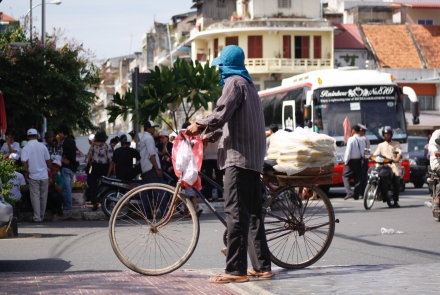
Photo by binh dang nam on Unsplash
Policy File: Developing Asia’s post-pandemic future
COVID-19 and its impacts’ rapid spread across Asia have exposed the inequality and fragility at the heart of the region’s development, Sango Mahanty writes.
When COVID-19 took hold last year, writer Arundhati Roy wrote that the pandemic is a portal. It has laid bare the social inequalities and fragile dependencies that underpin the neoliberal development project – but in doing so, it provides an opening to rethink established pathways and priorities.
Globalisation and market development have been integral to growth in the region. But these developments have also entrenched inequalities, transformed environments, and raised critical governance challenges.
As UNESCAP’s 2020 economic and social survey of Asia and the Pacific observes, when economic growth comes at the cost of growing inequality and breaching planetary limits, “it is time to ask questions” about development pathways and the future of the region.
Consider some of these trends and challenges facing our region through the findings of a 2021 World Bank study on the social and economic implications of the pandemic. One of its headline findings is that “poverty reduction in East Asia and the Pacific stalled in 2020 for the first time in 20 years”.
Some sectors were worse hit than others, such as manufacturing, construction, and tourism. Employment and income losses have been significant and unequal across the region, amplified by the same mobility and work restrictions that were needed to save lives from COVID-19.
Even in a business-as-usual scenario, Asia can expect worsening inequality along existing axes of disparity such as income, gender, and access to key resources like health, education, and digital technologies. COVID-19 has also worsened existing vulnerabilities to food insecurity and the effects of climate change, often in uncertain ways.
Still, when one door closes, another opens, and opportunities exist for better policy-making in Asia. As the region’s policymakers navigate the social and economic challenges posed by COVID-19, they face an opportunity to engage the multi-dimensional nature of health and wellbeing on a stressed planet in new ways.
This would mean moving beyond narrow economic frames to integrate and address seemingly disparate areas, such as food systems, urbanisation, human security, environmental sustainability and wellbeing, and others. Some of these challenges are global in scope and must be addressed at many levels, but if they are approached in an integrated way, policymakers do stand a chance.
Asia and the Pacific are where The Australian National University’s history and networks run deepest. That’s why this year, in the 75^th^ Anniversary of the university, Policy Forum is zooming in on the future of the region with this In Focus: Developing Asia section – focusing on the future of the region’s least developed and lower middle income countries.
Walking through the portal opened by the COVID-19 pandemic is not optional. Yet, missteps could increase poverty and heighten risks for vulnerable populations. Policymakers and academics need to review and sometimes to rethink development approaches as the region begins to chart its way out of the pandemic.
As part of this, Policy Forum has asked contributors to broadly consider, in the countries where they work, ‘where to from here?’. Moving past the simple headlines, they will press into the most pressing developmental challenges and policy concerns the region’s developing countries face and show that and some of the biggest gains could be made in the corners of Asia too often ignored in policy debate.
As always, we hope you find the discussion valuable, and we invite you to join in the conversation.
This article is part of Policy Forum’s In Focus: Developing Asia section, which brings you analysis from experts on the policy challenges facing its least developed members.
Updated: 27 July 2024/Responsible Officer: Crawford Engagement/Page Contact: CAP Web Team













